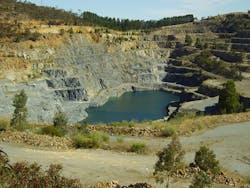D.C. Rock and Gravel Facility settles Clean Water Act violations with EPA
PHILADELPHIA, OCTOBER 5, 2016 -- The U.S. Environmental Protection Agency has entered into a settlement agreement with Recycled Aggregates, LLC and John Driggs Company, including a penalty of $32,400, resolving alleged Clean Water Act violations at a rock and gravel processing facility located at 1721 S. Capitol St. SW in Washington, D.C. EPA alleged that these parties discharged stormwater runoff into the municipal separate storm sewer system (MS4) and the Anacostia River without a discharge permit as required by the Clean Water Act.
"This settlement underscores the seriousness with which EPA regards unpermitted stormwater discharges to our nation’s waterways," said EPA Regional Administrator Shawn M. Garvin.
"Our agency will not hesitate to take vigorous enforcement action to protect and restore urban rivers like the Anacostia."
Uncontrolled stormwater runoff from industrial sites often contains sediment, oil and grease, chemicals, metals, and other pollutants. Discharges of untreated stormwater runoff into an MS4 can result in chemical and biological impairments to our nation’s waterways. The Clean Water Act requires owners or operators of regulated industrial facilities to obtain permit coverage before commencing industrial activity.
The permit requires the reduction or elimination of pollutants from stormwater runoff by adopting and implementing best management practices including materials storage and containment, runoff reduction measures, and employee training.
As part of the settlement, Recycled Aggregates and John Driggs Co. did not admit liability for the alleged violations, but they have certified that they have obtained permit coverage and are in compliance with the Clean Water Act requirements.
